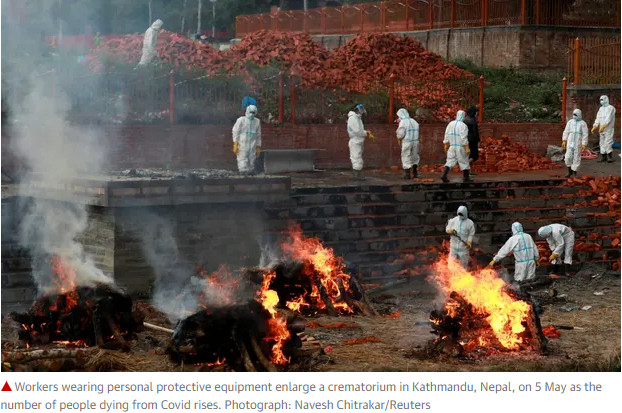
Story
During the Covid wave, Nepal is facing a "human catastrophe" close to India's.

Nepal is battling an outbreak of Covid-19 incidents, raising concerns that the situation in the Himalayan country may be as grim, if not worse, than in neighboring India, with which it shares a long and porous frontier.
Nepal has requested immediate foreign assistance after health officials warned earlier this week that the country was on the verge of losing control of the outbreak.
As the country's highest daily number of new infections – 9,070 – was registered, Prime Minister KP Sharma Oli, who has been chastised for his handling of the situation, requested the army to assist in the management of emergency facilities to relieve pressure on the health system.

Severe outbreaks have reached the capital, Kathmandu, as well as the south-west and west of the country, due to a lack of vaccinations and overburdened hospitals. The national positivity score, or the number of positive samples, is estimated to be at a whopping 47 percent. In certain areas, rates are much higher.
Oli made an appeal to the international community for vaccination earlier this week, when authorities warned that anyone who had already taken a first injection of the AstraZeneca vaccine required second doses immediately.
The illness has been blamed on the government's haphazard vaccine programme, which saw residents queue for hours in the capital.
Travelers reported checkpoints in Kathmandu en route to the airport amid fresh lockdowns and the suspension of most foreign flights.
The city Nepalgunj in the Banke district, close to the border with the Indian state of Uttar Pradesh, has become one of the worst-affected areas outside of Kathmandu, with a sudden influx of thousands of returning Nepali migrant workers from India ahead of the closing of the border between the two countries.
“We need to act now and we need to act fast to have any hope of containing this human catastrophe,” said Alexander Matheou, the Asia Pacific director for the Federation of Red Cross and Red Crescent Societies.
Netra Prasad Timsina, the chair of the Nepal Red Cross, said: “What is happening in India right now is a horrifying preview of Nepal’s future if we cannot contain this latest Covid surge that is claiming more lives by the minute.”
Catholic Relief Services' Nripendra Khatri outlined the situation and the challenges Nepal faces in responding to the crisis.
“Because of how quickly the virus is spreading, many people in Kathmandu are staying at home right now. Around the same moment, hospitals and pharmacies are seeing long queues.
“Access to transit and drugs has been hampered as a result of the lockdown in major cities. Family members are reluctant to adequately administer last rites and cremation centers around the world are quickly filled up.
“Logistics in Nepal are difficult, particularly for specialized medical equipment. Since our country is landlocked, supplies are often shipped overland from India, but India currently needs all of its medical equipment.
“This ensures that all must pass through airports, and all commercial flights have been halted with the exception of two weekly flights to Delhi, India. Once supplies arrive in Kathmandu, they must be dispersed around a mountainous region.
He added: “Many places are only accessible on dirt roads or by foot. Responding to this crisis and ensuring remote villages have access to tests and supplies will be a massive undertaking.”
With fewer doctors per capita than India and a much poorer health infrastructure, cases in Nepal have risen from around 100 a day to over 8,000 in the last month.
For a world with a population of about 30 million inhabitants, there are only around 1,600 intensive care beds and less than 600 ventilators. In comparison to India, there are 0.7 doctors per 1,000 population.
The Nepali regime, like India's, authorized a number of major religious festivals to take place, including Pahan Charhe, which aided the disease's spread.
According to reports in Nepali-language newspapers, the government's belated and opaque efforts to obtain vaccines from the Serum Institute of India were carried out by middlemen in return for hefty commissions.
The majority of government-run clinics are overburdened, and many lower-income residents cannot access private insurance.
The head of the clinical research unit at the Sukraraj Tropical and Infectious Disease hospital in Teku, Dr Sher Bahadur Pun, told the Kathmandu Post that patients were being treated on the floor and courtyard, as if they were in a war zone.
In a stark indication of the crisis, Nepal’s ministry of health conceded in a statement last week it was losing control of the situation. “As the number of infections has increased beyond the control of the health system, it has become tough to provide hospital beds for care.”
